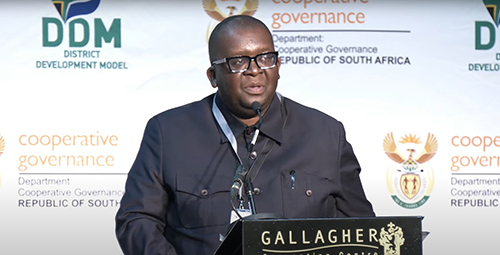Gauteng, 02 October 2025 – KwaZulu-Natal MEC for Cooperative Governance and Traditional Affairs, Rev. Thulasizwe Buthelezi, has used the Local Government Indaba—currently underway at the Gallagher Conference Centre in Johannesburg—to make bold recommendations aimed at improving service delivery in municipalities.
The Local Government Indaba, convened by the Minister of COGTA, Mr Velenkosini Hlabisa, has brought together all mayors from across the country, along with key institutions such as the Auditor-General of South Africa, the Human Rights Commission, and the National House of Traditional and Khoisan Leaders. The gathering marks 25 years of democratic local government and provides a platform to reflect on its progress and challenges.
MEC Buthelezi participated as a panellist reviewing the past 25 years of local government and planning for the next 25 years. The Indaba takes place against the backdrop of the White Paper review on local government, which is expected to be tabled in Parliament in the coming months. During his address, MEC Buthelezi raised several critical issues that continue to hinder service delivery.
He called for an amendment to Chapter 12 of the Constitution to clearly define the role, functions, and powers of amakhosi. Chapter 12 of the Constitution deals with Traditional Leaders and recognises the institution, status, and role of traditional leadership according to customary law, subject to the Constitution.
MEC Buthelezi expressed his hope that the White Paper review process would thoroughly consider the role of traditional leaders.
“There is so much development taking place on the land of amakhosi. For Spatial Planning and Land Use Management to be effective, the role of amakhosi must be clearly defined. We need to ensure that the presence of amakhosi is not ceremonial, but that they are an integral part of development,” he said.
He further noted that the provision of housing, bulk water infrastructure, and electricity often progresses slowly because financial resources remain with provincial and national government, while planning occurs at the municipal level.
“Implementing a housing project can take up to 10 years. Even after a site is identified and plans are submitted, the process of transferring funds from national to local government—up to the point of appointing a contractor—is lengthy. This has created a backlog in many areas of service delivery. Let us use the White Paper review to explore how we can streamline this process,” he added.
As poor revenue collection continues to be a major challenge for many municipalities, MEC Buthelezi appealed to Minister Hlabisa to champion his call for the National Treasury to redirect funds from departmental budget allocations to municipalities that are owed money.
He also highlighted the challenges posed by the current grading system of municipalities, which standardises remuneration packages for senior managers, including scarce skills such as engineers and accountants. This, he argued, makes it difficult for municipalities to attract skilled professionals, forcing them to rely on costly consultants. He further reflected on the loss of institutional memory due to the short-term contracts of senior managers.
“For example, a municipal manager is employed for only five years. The first two years are spent settling in, and the next three years are spent looking for the next job. So, when do they focus on turning the municipality around? I recommend that we review these contracts. When they leave, municipalities lose institutional memory, which causes further delays,” he said.
The Local Government Indaba will conclude on Friday, 02 October.

